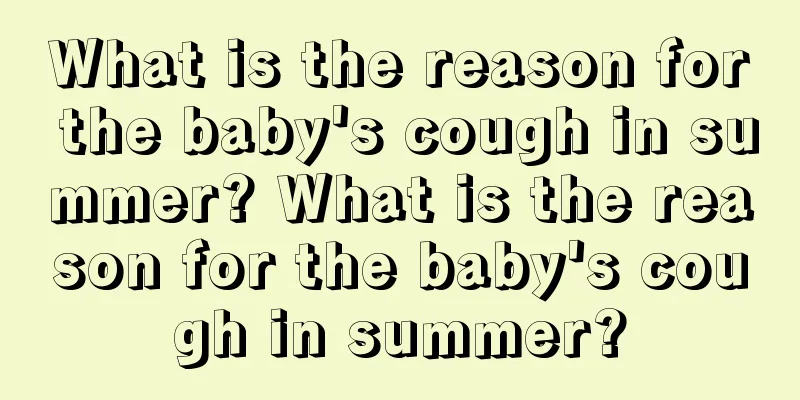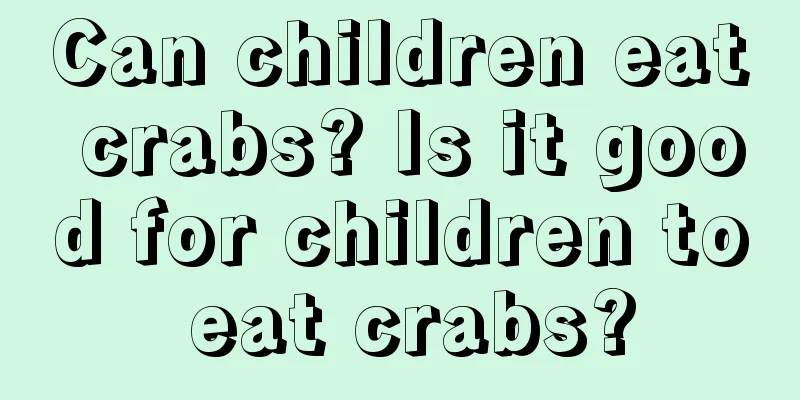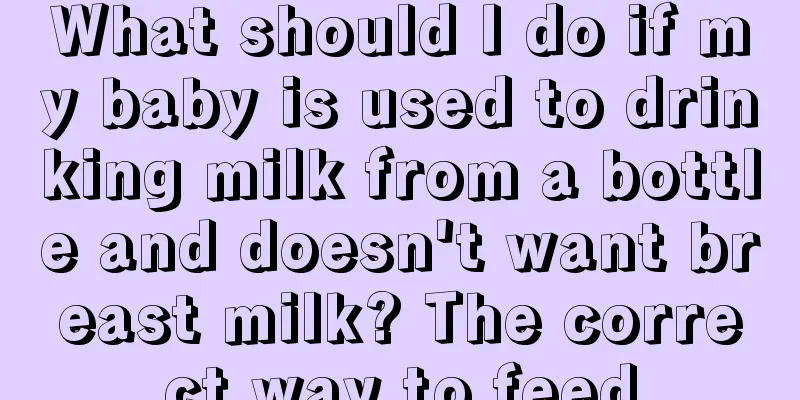What is the reason for the baby's cough in summer? What is the reason for the baby's cough in summer?

|
What is the reason for babies to cough in summer? The change of summer climate and the change of indoor temperature difference can easily make babies cough. Baby coughing in summer has become a common disease in babies in summer. Today, I will introduce to you how to relieve baby's cough in summer and what are the reasons for baby's cough in summer. What is the reason for baby's cough in summer?Source 1: Inhalation There are two types of inhalants: specific and nonspecific. The former include dust mites, pollen, fungi, animal dander, etc.; nonspecific inhalants include sulfuric acid, sulfur dioxide, chloramine, etc. In summer, some families do not clean and disinfect the air conditioner in time, or even spray mosquito repellent improperly, which is also one of the main reasons for the frequent coughing of babies. Sin 2: Infection The formation and onset of cough are related to repeated respiratory tract infections. Many children with cough may have infections such as bacteria, viruses or mycoplasma. After infection, the above pathogens can directly damage the respiratory epithelium and increase respiratory reflexes, causing the baby to cough constantly. Especially in summer, many babies are too fond of coolness, or suffer from sudden changes in temperature, disrupting their normal routines, and are prone to heat colds or viral colds, with symptoms such as coughing and runny nose. Source 3: Food allergies Nowadays, coughing attacks caused by dietary factors are more common, especially in infants and young children who are prone to food allergies, but this rate gradually decreases with age. The most common foods that cause allergies are eggs, milk, peanuts, meat, seafood, etc. In addition, cold drinks in summer are also one of the factors that trigger cough and asthma in children with allergic cough. Source 4: Air currents and climate Changes in air temperature, pressure and/or ions in the air can induce coughing. In summer, some families turn on the air conditioner for their babies for a long time. However, children under one year old should not use the air conditioner for a long time, which can easily cause coughing and wheezing. Source 5: Mental Factors Some children with a history of cough and asthma may experience coughing attacks if they are emotionally excited, nervous, angry, etc. It is generally believed that it is caused by cerebral cortex and vagus nerve reflexes or hyperventilation. In summer, some babies will become restless and irritable due to the climate, and are often prone to coughing attacks. Sin 6: Sports About 70% to 80% of children with coughs develop cough or wheezing after strenuous exercise, which is called exercise-induced cough or exercise-induced asthma, or exercise-induced cough or exercise-induced asthma. Clinical manifestations include cough, chest tightness, shortness of breath, wheezing, and wheezing can be heard by auscultation. In the summer, some parents are eager to let their babies with allergic constitutions exercise, so they send their babies to summer camps to do various exercises such as swimming, long-distance running, and playing basketball. Parenting experts suggest that proper physical exercise can indeed help improve the physical fitness of children, but if the baby is ill, he should be cautious about participating in such activities, and should exercise reasonably under the guidance of a doctor. The difference between baby coughCompared with adults, children's cough has many different characteristics: (1) Children's respiratory defense function is not sound, and their cough reflex is not sensitive. They often do not cough actively, especially do not expectorate, and their coughing force is relatively weak, and they cannot cough up phlegm. Therefore, when children suffer from pneumonia or tracheitis, there is often a phlegm sound in the larynx, which is especially obvious when they are sleeping. (2) Children do not consciously cough up phlegm. When the phlegm reaches the throat, it is automatically swallowed into the stomach. Since children's coughs are often accompanied by vomiting, what is vomited out of the stomach is often mucus. The phlegm swallowed into the stomach passes through the entire digestive tract with food and is finally excreted from the body with feces. Therefore, infants and young children who cough often have diarrhea symptoms. (3) Children’s larynx, trachea and bronchi are relatively narrow, their cough reflex is insensitive and their coughing power is weak. Newborns and malnourished or weak infants have even poorer coughing ability. If the sputum is thick, sputum blockage and suffocation are likely to occur. (4) When a young infant has a cough, he or she may choke when drinking water or feeding, which may cause suffocation due to milk entering the trachea and blocking the respiratory tract, which is life-threatening. In addition, when a child vomits due to a cough, he or she may easily inhale the vomit and cause suffocation. It is better for babies to eat these when they have a cough1. Garlic From the perspective of traditional Chinese medicine, garlic is spicy, sweet and warm in nature. It can warm the stomach, help digestion and regulate qi, detoxify and kill insects. It also has the functions of protecting cardiovascular and liver function, preventing colds and strong sterilization. Therefore, if you drink some garlic water in moderation, it will have a good effect on the recovery of children's cough. 2. Pear When I was a child, my family would boil a pear and add sugar to it when I had a cold and cough. In fact, pears do have the effect of curing coughs. Because pears themselves contain a lot of protein, fat, calcium, phosphorus, iron, glucose, fructose, malic acid, carotene and multiple vitamins. In addition, pear peels, pear flowers, leaves and roots can also be used as medicine, which has good effects of clearing heat, eliminating phlegm, moistening the lungs and detoxifying. It has good effects on dryness and heat cough, cold cough, measles cough and tracheitis cough. 3. Loquat In the Compendium of Materia Medica, loquat is described as "quenching thirst, lowering qi, benefiting lung qi, stopping vomiting and thirst and phlegm." It can be seen that loquat has a very good therapeutic effect on children's cough. Of course, the most common way to eat loquat is to remove the outer skin and eat it directly. But be sure to clean the skin because it is very dirty. 4. Radish Radish has the functions of clearing away heat and promoting body fluid, cooling blood and stopping bleeding, resolving phlegm and relieving cough, promoting urination, and detoxifying. The simplest way is to boil a bowl of radish water for children, which has a good effect on cough. Of course, you can also make radish ginger juice, radish soup, candied radish, radish sake decoction, etc. as a medicinal diet to better treat children's cough. 5. Oranges Oranges are sweet and sour, and cool in nature. For children, they have a good effect of stimulating appetite, regulating qi, quenching thirst and moistening the lungs. When children have a cough, you can roast oranges or stir-fry them in a pan. Let the children eat them, and the effect of treating cough will be better. 6. Chinese Cabbage Chinese cabbage is slightly cold in nature, and has the effects of clearing away heat and relieving restlessness, quenching thirst and promoting urination, promoting bowel movement, and clearing lung heat. This common dish can be used to prevent and treat colds, dry coughs, hoarseness, constipation, etc. It is better for babies with dry coughs to eat more Chinese cabbage. 7. Tomatoes Tomatoes are cool in nature, slightly cold, sweet and sour in taste. They can clear away heat and quench thirst, nourish yin, and cool blood. They belong to the liver, stomach, and lung meridians. They have the effects of promoting fluid and quenching thirst, strengthening the stomach and digestion, clearing away heat and detoxifying, cooling blood and calming the liver, nourishing blood and increasing appetite. The tomato contained in it has the effect of inhibiting bacteria. Therefore, it can also have an anti-inflammatory effect for patients with cough. |
<<: Does WiFi have any effect on babies? Does WiFi have any effect on newborns?
>>: Can babies get rabies vaccine? Can babies get rabies vaccine?
Recommend
Why is the baby's nose dry? Two reasons need to be paid attention to
The baby's resistance is relatively weak, so ...
What is the cause of milk blockage? There may be several reasons
New mothers are prone to milk duct blockage in th...
Kindergarten breakfast recipes Kindergarten breakfast recipes
The school season is coming soon, and many babies...
Will baby bloating cause constipation? What should I do if my baby has bloating and constipation?
It is normal for babies to have bloating. There a...
How to prepare for pregnancy in summer
Summer is here. How can we married ladies prepare...
How should mothers teach their daughters to be good role models?
There is a saying that mother and daughter are co...
Why do you need to shave before giving birth? Does it hurt to shave before giving birth?
Childbirth is the most difficult time in a woman&...
When is the best time for newborns to supplement calcium? When does the umbilical cord of a newborn fall off?
Newborn babies develop very quickly. Many parents...
Will a baby's brain be damaged if he has diarrhea and a fever of 39 degrees? What should I do if my baby has diarrhea and a fever of 39 degrees?
There are many types of fever. One type is fever ...
How to care for cesarean section scars and postpartum scar repair methods
There are two most common ways for women to give ...
When should a child be weaned? What are the good ways to wean?
Dear mothers, do you know the correct time for we...
What are the consequences of a child's severe calcium deficiency?
Calcium deficiency in children is a relatively co...
Can I breastfeed if I catch a cold during confinement? Can I take medicine if I catch a cold during confinement?
The confinement period is a recovery period for w...
What kind of heating is good for confinement in winter?
Many people have confinement after childbirth in ...
How to effectively increase milk production? Breastfeeding is the key
Mothers with insufficient milk always try to find...









